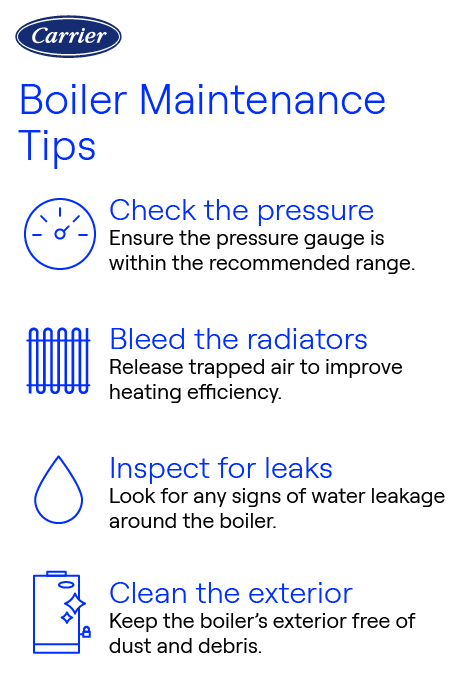Boiler Maintenance and Troubleshooting
By Travis Baugh
Boilers are an essential component of many residential heating systems, providing warmth and comfort during the colder months. However, like any mechanical system, boilers can experience issues from time to time that require boiler repair. Understanding common boiler problems and knowing how to troubleshoot them can help you maintain a reliable and efficient heating system.

Boiler Troubleshooting
There are several common boiler issues that homeowners may encounter. These include:
- Uneven heating: If some rooms in your home are warmer than others, it could indicate an issue with your boiler.
- Some radiators not heating: Check that the radiator valve is properly adjusted. Check for a low water level in the tank. Check for buildup of sludge in the pipes by releasing the air out of one of the radiators. If the drained water is dark, that indicates buildup inside your pipes. Contact a professional to have this sludge removed.
- No hot water: A lack of hot water can be caused by various factors, such as a faulty thermostat, a malfunctioning heating element, or a problem with the pilot light.
- Boiler or radiators making a whistling sound, like a steam kettle: Check the boiler thermostat to ensure it is working properly and replace it if it isn’t. If the thermostat is functioning properly, this indicates there could be a buildup of minerals in the pipes or the tank. Contact a professional to shut off the system and repair.
- Loss of pressure or slow build of pressure: This is usually an indication of a leak in the steam pipe or exterior tank, and requires an expert to shut off the system and check for a hole. Check for dripping around the pipes or the tank, which could indicate a leak. Check for hidden leaks with a water meter to see if the system is losing water.
- Pilot light keeps going out: If your boiler's pilot light frequently extinguishes, it may be due to a faulty thermocouple or a draft in the system.
- Boiler runs noisily: If you hear a whistling sound, bleed the radiators to release the air trapped in the system. If you hear rattling, check for loose connections in the valves that can rattle as air flows through.
Troubleshooting Steps For Boiler Issues
- Inspect the boiler's pressure gauge to ensure it is within the recommended range.
- Examine the pilot light to ensure it is lit and burning steadily.
- Check for any visible leaks or signs of water damage around the boiler.
- Clean or replace clogged filters to improve boiler efficiency
Boiler Maintenance Tips

Regular maintenance is essential for keeping your boiler running efficiently and extending its lifespan. It is recommended that the following preventative maintenance steps be performed by a trained HVAC technician to ensure optimal performance and prevent potential breakdowns.
1. Check the pressure: Maintaining the correct pressure is crucial for the smooth operation of your boiler.
2. Bleed the radiators: Over time, air can build up in your radiators, causing them to become less effective at heating your home. By bleeding the radiators, your dealer can release any trapped air and improve their efficiency.
3. Inspect for leaks: Regularly check your boiler for any signs of leaks, such as water puddles or dampness around the unit. If leaks are detected, it's important to address them promptly to prevent further damage.
4. Clean the exterior: Dust and debris can accumulate on the exterior of your boiler, hindering its performance. Use a soft cloth to gently wipe away any dirt and ensure proper airflow around the unit.
When To Call A Professional for Boiler Maintenance Near Me
Every homeowner has a different comfort level working with boilers. While there are some tasks you can handle yourself, many boiler issues require professional help, especially if you’re uncomfortable performing any troubleshooting yourself. Trained experts can help resolve your heating issues quickly and easily. Your local Carrier dealer can perform a thorough inspection, clean internal components, and identify any potential issues before they escalate.

Frequently Asked Questions On Boiler Troubleshooting and Boiler Maintenance
- Learn about boiler repair
- What is the cost of a boiler replacement vs. new boiler?
- Learn about boiler installation
- Discover boiler vs. Furnace: What’s The Difference

